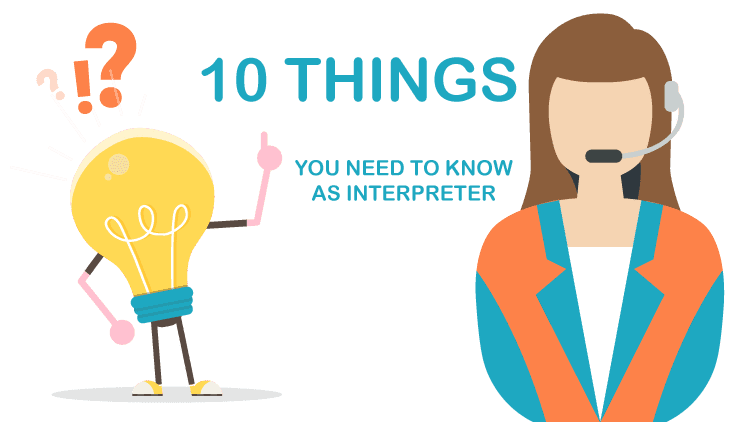10 Things You Need To Know About Working As An Interpreter

No big step in life should be taken without doing proper research first. For instance, picking a career for yourself is not something you should do without giving it a good thought. Even if it is something you want to do, familiarizing yourself with a few essential points wouldn’t hurt.
When using consecutive interpretation, the interpreter sends the message after producing a piece of the source language and during a pause. If you have never interacted with professionals from a field, you would be going blind. Interpreter services will continue to be in high demand in the coming years as the world’s population and language variety grow. According to Campbell, the UN is desperate for native speakers/ English speakers to translate into Russian. Because the accurate message is interpreted and not just word for word. Linguistic proficiency is essential for interpreters.
But if you do your research and learn about it first, it will significantly help you in the future. You can make a good start if you know things related to your field. People generally think and expect an excellent translator to be able to speak and understand a foreign language. Working with these folks requires “oral interpretation,” which entails mouthing speech discreetly and attentively so that their lips may be read easily. A consecutive interpreter/language interpreter, in contrast, is very visible.
Remembering these tips will provide the most accurate interpretation and flow of conversation. VRI (remote video interpreting) is a simple video communications service you can utilize anywhere in the United States.
10 Things You Need to Know About Working as an Interpreter:
Those who can bridge the gap between people will always be needed in a diverse world. Language experts allow people to connect despite the barriers between them. Through their help, people can familiarize themselves with different cultures, negotiate with their enemies, and communicate with a foreign audience.
An experienced interpreter should have a suitable university degree, undergo extensive training, and stay updated on industry developments. Conference interpreters often do simultaneous interpreting. However, if you plan on joining the industry as an interpreter, you must learn a few things about it first. You will most likely struggle in your profession if you decide to go blind. Interpreters have a strong foundation of formal education, specialized language skills, and interpersonal skills gained through experience.
While your interpreter is familiar with common metaphors and slang, such cultural expressions may not transfer well into the target language.
A successful interpreter has a cross-cultural understanding of the source and target languages. A skilled interpreter can help you to accomplish precisely that. Health or medical interpreters and translators help patients communicate with doctors, nurses, technicians, and other medical personnel in healthcare environments. Because educational interpreting and transliterating are considered Related Services, an educational interpreter or transliterator is a member of the IEP team for any student who is D/HOH receiving this service.

A legal interpreter is a professional who can translate exchanges between two parties who speak different languages, such as in court hearings and trials, contract negotiations, depositions, witness hearings, police station interrogations, and administrative authority exchanges, among other situations. Interpretation is more critical when translating official documents verbally, such as in a legal proceeding or courtroom.
Language education and experience lay a strong foundation for interpreters, but being an empathetic listener is just as important. Language translators convey concepts to foreign-language speakers in various environments, some of which may be life-changing. A skilled translator can also be a person who wishes to be a bridge between two individuals who have a language barrier.
What are the main requirements to be a good interpreter?
To be a good interpreter, you must fulfill these requirements:
- Be a good listener. If you can’t focus on the speaker’s words, you won’t be able to interpret them.
- Have good observation skills. You should be able to notice the changes in the speaker’s body language if you want to interpret them accurately.
- Be fluent in two languages.
How do I start working as an interpreter?
If you wish to start working as an interpreter, then you should:
- Get a degree in interpretation or language studies
- Achieve fluency in a second language
- Learn about the cultural aspects of both the languages you speak
- Work on your observation skills
- Improve your vocabulary
- Practice extensively to avoid making any mistakes once you start working professionally.
What are the duties of an interpreter?
Here are the primary duties of an interpreter:
- Listen to the speaker attentively
- Observe the body language and gestures of the speaker
- Interpret their speech for the target audience
- Make the interpretation culturally accurate according to the preferences of the audience
- Be clear in their speech so they can be understood easily by the audience
Here are the ten things you need to know about working as an interpreter:

- Different from Translation & Translation app:
A common misconception is that translation and interpretation are the same. In truth, the two have plenty of differences. Consecutive interpreting, as opposed to SI, maybe more routinely utilized in the assessment and intervention of spoken language. Interpreters and translators in both languages must understand medical terminology and standard medical terms. The most significant difference between the two is that an interpreter has to perform their duties in real-time. They listen to conversations and interpret them within seconds. On the other hand, a translator can take as long as they need to finish their task, and they mainly assist with documents. Google Translate is a helpful tool for translators, too.
- Language Skills:
An interpreter must have better language skills than a translator. They must have a good grasp of the language to communicate with the audience effectively. Cultural differences can arise when there are language problems, obstructing your meeting if you are unaware of them. Sometimes, they have to talk to an educated audience; other times, they expect simplicity. Only someone with the proper skill set can accomplish this task.
- Good Vocabulary:
Whether an interpreter works in the corporate world or politics, they must interpret complicated conversations from time to time. English proficiency is a must for a good translator. But if they don’t have an extensive vocabulary, they won’t be able to do their job effectively. They might use the exact words repeatedly, which would annoy their listeners. Effective communication requires superior grammar knowledge and the capacity to discern idioms, nuance, and metaphors in speech.
- Good Listeners:
Anyone who is not a good listener cannot be an interpreter. An expert is someone who is a compassionate listener. An interpreter must have active listening skills. People don’t feel uncomfortable discussing something with them so they can provide accurate interpretations. If someone cannot listen to people attentively and pay attention to their gestures and body language, they should not join this field. They must also adapt to various conditions to deliver professional service.
- Specialty:
Although interpreters don’t pick a specialty immediately, they must do it in the long run. However, if they know from the start where they want to work, it will help them in their career. They will be able to work for that future from the start and pick more projects related to that field to get as much experience as possible. They understand that not all spoken and manually coded languages, including American Sign Language (ASL), have a written form. Such translators can mediate between two or more people and assist from and into their native language.
- Practice is a Must:
No one becomes good in this field overnight. They must practice for a long time before they can enter professional life. All the jobs related to language require extensive practice. There are multiple online resources for practicing, but people can also try interpreting news in their free time. Focusing on the spoken language, they can learn pronunciation and accent refinement.
- Freelancing vs. Agencies:
Before entering the field, people must decide whether to become a freelancer or work with an agency. Weighing the pros and cons of both options can help them decide. Most experts suggest working with an agency instead of freelancing as it pays more. All across the world, freelance translators with outstanding English skills are in demand.
- Cultural Understanding:
Culture is present in every aspect of human life. Cultures also influence languages in many ways. If someone does not understand their culture deeply, they cannot interpret their language accurately. There is also a business culture to remember when working with corporate clients.
- Quick Thinking:
Those who cannot think quickly when faced with a problem to come up with a solution won’t be able to perform well as an interpreter. It is a job where quick thinking is essential, and nothing can be accomplished without it. An expert should be able to come up with a solution quickly and convey it effectively to the audience.
- Continuous Research:
It is one of those fields where you must keep up to date about the latest events. People love using references when talking, but if you are unfamiliar with the latest slang and news stories, you might not understand them completely. Listening to the news regularly will also assist experts in their everyday tasks. It is critical to speak one or more languages fluently in addition to your mother tongue.
Now that you know what makes a person a good interpreter, you can decide whether or not it is something you want to do. If you choose to do it, you will end up helping countless people in your lifetime. You will be bringing them closer together when languages are keeping them apart. Something else to work on is your native tongue. You will also get better at your job with each passing day. So, decide today and start practicing to become good at your job.
Frequently Asked Questions
An interpreter must be able to listen actively and effectively. Languages are a passion for me. The capacity to comprehend spoken words so that their meanings and messages may be conveyed accurately. Ability to converse effectively with people from various cultures and backgrounds.
You should do these three things while working with an interpreter:
- Request that the interpreter does not modify or amend any part of the conversation.
- Speak clearly and in a normal tone.
- Allow more time for interpreted communication.
People choose to work as interpreters because they are interested in American Sign Language, Deaf culture and exposed to a wide range of intriguing topics and events.
A professional interpreter’s job is to help two or more people who speak different languages communicate. Professional interpreters can only translate the words that are said in this situation.




